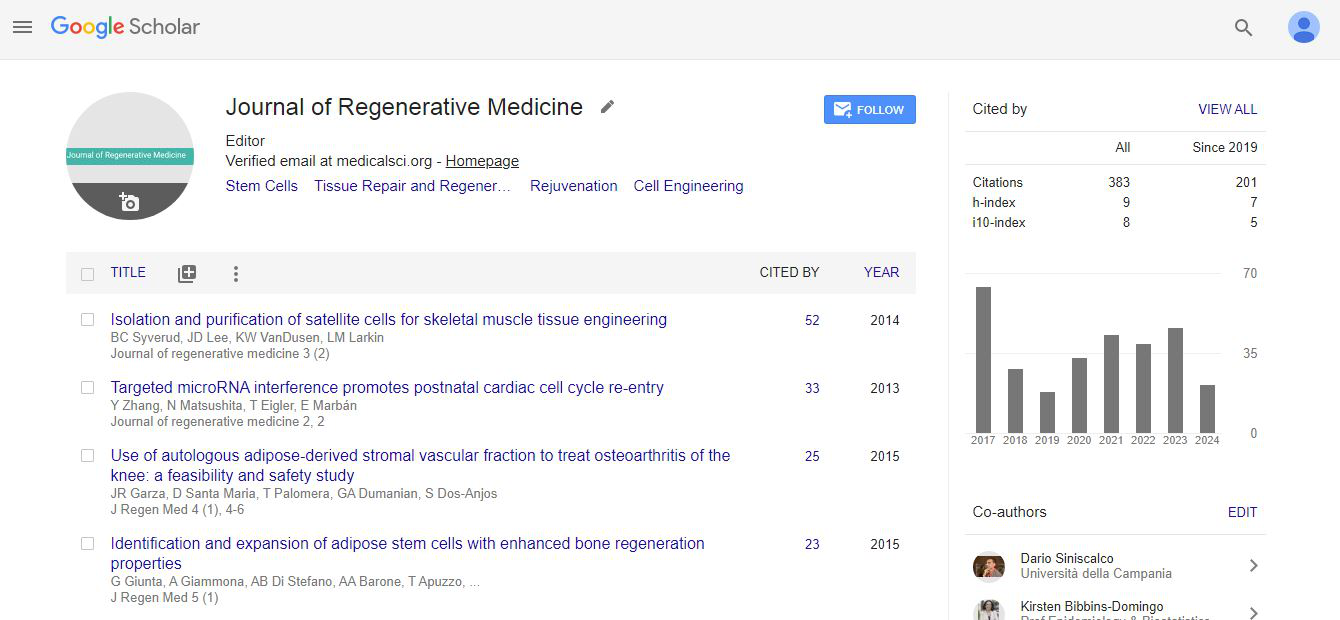Research Article, J Regen Med Vol: 2 Issue: 1
Bio-Engineered Mesenchymal Stromal Cell (MSCs) Grafts for Skin Repair/ Regeneration - Preclinical Aspects
| Lucia Formigli1, Ferdinando Paternostro1, Alessia Tani1, Carlo Mirabella2, Alessandro Quattrini Li3, Daniele Nosi1, Riccardo Saccardi4, Benedetta Mazzanti4, Giulia Lo Russo3 and Sandra Zecchi-Orlandini1* | |
| 1Department of Experimental and Clinical Medicine – Section of Anatomy and Histology, University of Florence, Italy | |
| 2Immunohaematology and Transfusion Medicine, University Hospital of Careggi, Florence, Italy | |
| 3Department of Plastic Surgery, University of Florence, Italy | |
| 4Department of Hematology, Cord Blood Bank, University Hospital of Careggi, Florence, Italy | |
| Corresponding author : John A Loudon, PhD Wetherill Park Medical Centre, Suite 101, Stockland Mall, Polding St., Wetherill Park, Sydney, NSW, 2164, Australia, Tel: +61-2-9756-3636; Fax: +61-2-9756-3637 E-mail: jon.uk1515@gmail.com |
|
| Received: January 27, 2013 Accepted: March 16, 2013 Published: March 21, 2013 | |
| Citation: Loudon JA (2013) Use of Immortalized Differentiated Cells for Regenerative Medicine J Regen Med 2:1. doi:10.4172/2325-9620.1000106 |
Abstract
Bio-Engineered Mesenchymal Stromal Cell (MSCs) Grafts for Skin Repair/ Regeneration - Preclinical Aspects
There is growing evidence showing the promise of mesenchymal stromal cells (MSCs) for the treatment of cutaneous wound healing. In a previous study, we have shown that MSCs seeded on an artificial dermal matrix, Integra® enriched with platelet rich plasma (EmatrixTM) have enhanced proliferative potential as compared to those cultured on the scaffold alone. In this study, we wanted to extend the experimentation by evaluating the efficacy of the MSCs bioengineered scaffolds in the healing of skin wounds. To this purpose, full-thickness skin defects were created on the dorsum of rats and covered with (a) Integra®, (b) EmatrixTM , (c) Integra® plus MSCs, (d) and EmatrixTM plus MSCs, or (e) left to heal spontaneously (control). It was found that the presence of MSCs within the scaffolds significantly accelerated wound healing and greatly ameliorated the quality of regenerated skin; it reduced collagen deposition, enhanced re-epithelization, increased neo-angiogenesis and promoted a greater return of hair follicles and sebaceous glands. In conclusion, the results of this study provide strong evidence that the treatment with MSC-seeded scaffolds represents an attractive approach for augmenting the regenerative potential and enhancing cutaneous wound healing.
 Spanish
Spanish  Chinese
Chinese  Russian
Russian  German
German  French
French  Japanese
Japanese  Portuguese
Portuguese  Hindi
Hindi 